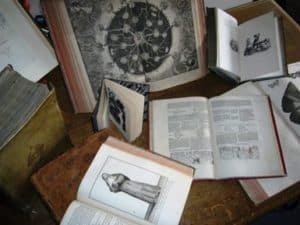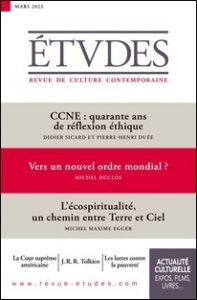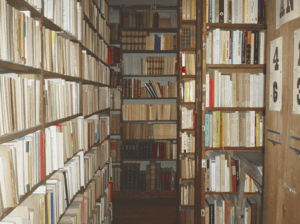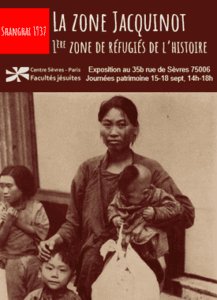Library
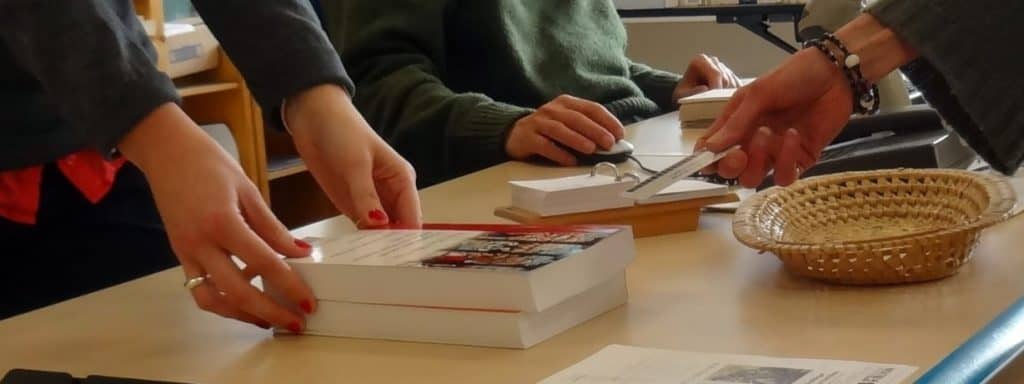
The Facultés Loyola Paris Library
Located in the 6th arrondissement, at the heart of the Faculties’ premises, the Facultés Loyola Paris Library is one of France’s largest libraries for philosophy and theology. It welcomes students, teachers and researchers, as well as to external readers
These impressive collections in philosophy and theology are enriched with new resources in line with the courses given at the Faculties. They also include documents on Jesuit history and remarkable early works (Books from the 15th and 16th century).
The library is open from Monday to Friday, from 9 am to 7 pm (Friday on 5 pm). Over 7,000 volumes are freely accessible. Nearly 10,000 documents are borrowed each year.
The library holds some 440,000 volumes and 850 periodical titles from the collections of Jesuit collected over the centuries. Its books collections, which can be considered in France as the largest private collections, include some remarkable early works (incunabula, 1st editions). A large part of the book is in Latin, English, German, Italian and Spanish.
The Library Council, bringing together teachers and outside experts, recently approved a strategy aimed at making
making available to all this philosophical, theological and literary heritage, an inexhaustible source of knowledge and wonder.
- The library in figures:
440,000 items stored in Paris
+ 500,000 documents on deposit for 50 years at the Municipal Library of Lyon,
making it one of the largest private libraries in France.
Public: 400 students, 2,000 auditors and researchers, nearly 1000 visits by mont.
- Rare books:
. 60 incunabula (first works printed between 1455 and 1500),
. 2,600 16th-century works
. 1st edition of Descartes‘ Discours de la méthode (1637), 1st edition of Rousseau‘s Discours sur l’origine et les fondements de l’inégalité parmi les hommes (1755), Kant‘s habilitation thesis defended in 1755 in Königsberg, Luther‘s tracts (1520), 1st edition of Therese of Avila‘s Traicté du chasteau ou Demeures de l’âme (1601), Acts of the Council of Trent (1567).
Support the Library / Become a Patron
Digitization of old, rare and remarkable documents
Most heritage libraries have undertaken the digitization of their collections, in order to preserve them and make them freely accessible to the public.
The Loyola Paris Faculties has recently taken part in this movement and have undertaken to have some 250 works digitized each year, in partnership with the French National Library (BnF): incunabula, illustrated editions from the 16th century, 1st editions. To these will be added sets of letters from Jesuits on mission in the 19th and 20th centuries, providing extremely interesting information on daily life in China, India and America in the 19th and early 20th centuries.
BnF subsidizes part of the digitization work, which will complement the national digital collections available on Gallica digital library. The remaining digitization costs – as well as the costs of preparing, checking and monitoring the project – is borne by the Loyola Paris Faculties. The digitized documents can be browsed from the Loyola Paris Faculties catalog, giving on-site and remote users easy access to the digitized collections.
Articles are written and put online in the library’s website, putting the work into context. Digitized documents also feed the monthly Loyola Paris Faculties newsletter and shall feed the BnF newsletter, distributed to a wide audience.
A large part of dizitised books will also be presented on the “Shared Heritage” BnF sites : Libraries of the Middle East, France-China, France-South Asia, France-Vietnam, France in the Americas.
More information about digitization
Cataloguing the “Etudes” Jesuit collection
Études is a monthly general-interest magazine founded by the Jesuits in 1856. A 144-page journal of contemporary culture, it deals with social, political, ethical and theological issues, offering original ten-page summaries with the most competent authors in their field. It includes sections on theater, exhibitions and cinema, as well as an extensive book review. Today, with 11,000 subscribers and a print run of 15,000 copies, Etudes is one of France’s most widely circulated magazines.
The Etudes magazine library, previously located near the editorial board at 15 rue Monsieur in Paris, joined the Loyola Paris Faculties collections in 2012. The 110,000-strong collection includes not only the general works needed to write articles, but also a large number of books sent by their authors for review. The books are often autographed (Claudel, Bernanos, Gide, ….).
There are also collections of letters written by Jesuit soldiers during the 14-18 war and old books, probably from the personal collections of Jesuit fathers.
However, only a small part of this collection has been included in the library’s online catalog: most of the works are not visible and can therefore neither be consulted nor borrowed by the public, who are unaware of this very important literary and cultural collection.
Loyola Paris Faculties would therefore like to have a service provider manually take over the records for this collection and integrate them into the library catalog. This would considerably enrich the Loyola Paris Faculties Library offer and give visibility to documents that are useful for reflection and research.
Exhibitions for Heritage Days
On the occasion of Heritage Days 2023, the Loyola Paris Faculties Library organized a first exhibition about “Shanghai 1937: the Jacquinot zone, the first refugee zone of the history“. Curated by Jean-Luc Pinol, historian and professor at ENS Lyon, the exhibition highlighted the actions of Jesuit Father Jacquinot, a missionary in Shanghai and the instigator of the first wartime refugee zone during the Sino-Japanese war. The exhibition provided a historical perspective on a question that is still relevant today: how to care for civilians in wartime.
The exhibition was accompanied by a tour of the neighborhood, to the Paris Foreign Missions (MEP) and the Auxiliary Sisters, who were also hosting an exhibition on missionaries in China.
An exhibition website has been created in order to present the subject after the time of the exhibition.
The Loyola Paris Faculties Library would like to repeat this type of operation on Heritage Days 2025, on the occasion of a potential research project led by a library researcher on “the edifying and curious letters”. These form a 34-volume collection of letters sent to Europe by Jesuit missionaries in China, the Levant, India, America and elsewhere. Published between 1702 and 1776, this collection did much to open Europe, and especially France, to non-European cultures.
For this type of exhibition, the Loyola Paris Faculties need to be able to invest in exhibition furniture: showcases, glass columns and printed panels and booklets.
Opening during Heritage Days would enable Loyola Paris to play an even greater role in the local Parisian cultural scene.
Collections security
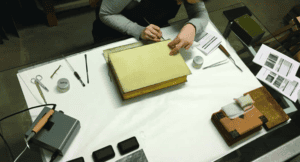
Prevention is the most effective way of limiting such losses. Controlling temperature and humidity levels in storage areas prevents the growth of mold and insects. Daily inspection of the premises, particularly during construction work, helps prevent short-circuits and leaks. The implementation of safety and security plans enables us to anticipate problems and list the rapid actions to be taken in the event of incidents. As part of this approach, the Loyola Paris Faculties Library would like to acquire emergency equipment and a number of fireproof and burglar-proof cabinets to store its most precious documents.
At the same time, certain alterations, linked to the intrinsic nature of the book and the passage of time, require consolidation and repair work. For example, books manufactured between 1850 and 1950 were generally produced using new industrial papers, known as “acid” papers. Some of these papers turn yellow to brown, become stiff and brittle, and disintegrate. The Loyola Paris Faculties would like to be able to carry out the necessary work to limit the deterioration of certain books, consolidate them and make them communicable again. One of the library’s staff has recently received free training from BnF in the maintenance and repair of collections. The Loyola Paris Faculties would now like to be able to purchase the equipment needed for this work and set aside time in its activities to allow for this ongoing restoration. It would also be desirable to be able to call on the services of an artisan restorer, to give greater scope to these restoration-repair campaigns.


